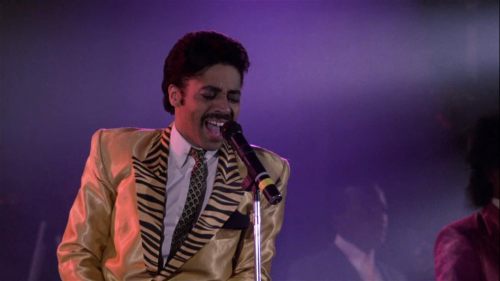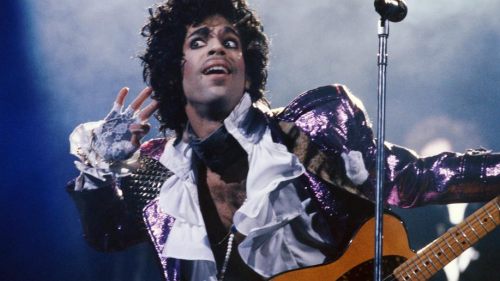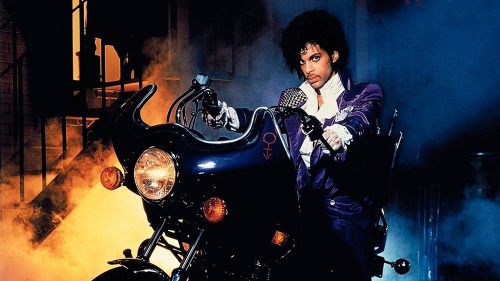In Defense Of The Batdance
Illustration by Jeff T. Owens.
This piece was originally written in February and published in our Batman v Superman issue of BMD.
I’ve seen the future, and it will be cruel to one of our greatest living songwriters.
Back in 1988 when Tim Burton was shooting his soon-to-be blockbuster film Batman, he had the idea to include two songs from ‘80s wunderkind Prince in key spots in the film. The two tracks were “1999” from the album of the same name, and “Baby I’m A Star” from the soundtrack to Prince’s magnum opus, Purple Rain.
If you know the songs, and you know the movie, you could place them easily, as there are only two needle drops in the finished version of the film. One, when Jack Nicholson’s Joker (in regalia inspired by Prince’s everyday attire) invades an art gallery and defaces it in a spectacular act of peacocking for his crush Vicki Vale, and second during Joker’s parade / ploy in the center of Gotham City. The initially proposed songs -- one is among Prince’s biggest singles, the other a showstopper from one of the highest selling albums of all time -- would have fit perfectly. Burton was barking up the right tree.
But in what could be seen as a be-careful-what-you-wish-for scenario, when Tim Burton requested the rights to those two tracks, he was instead delivered an entire album’s worth of new material from his muse.
Career-wise, Prince was in an interesting place in 1989: having rocked the world from 1980 to 1984 with five albums increasingly more popular than the last (Prince, Dirty Mind, Controversy, 1999 and Purple Rain), he was on a downturn in the back-half of the decade. His band, The Revolution, had disbanded after his follow-up feature to Purple Rain, titled Under The Cherry Moon, was a box office bomb (the soundtrack album Parade was met with mixed praise), and his next two albums, Sign O’ The Times and Lovesexy, saw his sales continue to decrease despite critical acclaim. It seemed his time in the spotlight was diminishing. As an incredibly prolific and gifted songwriter he was battling his own demons, internal and external, as the amount of content he was producing was hitting speed bumps in a conventional major label record cycle structure.
His label, Warner Bros., desperate for another hit album from the Minneapolis master, hopped on the synergistic opportunity to sell an album of original content by one of its biggest artists created exclusively for one of the most wildly anticipated films of the year. The gamble paid off in a big way, as Batman was Prince’s highest-selling album since his direct follow-up to Purple Rain, Around The World In A Day, saw great success but middling reviews. But in the legacy of his discography, and even against the film’s popularity, it is seen as a strange blemish, an odd choice and a cash-in. This legacy is disappointing because Batman is actually a great record, and a great entry point demonstrating to new fans what Prince is capable of musically.
Admittedly, as a soundtrack to a Batman film, Prince’s album is a bit of a head-scratcher. With only a handful of lyrical references to any of the characters (mostly residing in the track “Vicki Waiting”) and a few dialogue segments from the film peppered in, nothing about the film screams “Batman”… with the exception of the final track of the album (which we will get to later). If you heard this album in a vacuum where the film didn’t exist, it really wouldn’t fall out of line with what Prince was doing at the time.
Most of the time Batman (the album) operates as a strange spiritual sequel to his most critically acclaimed album Sign O’ The Times, both thematically and in its choice to radically shift in tone from track to track. The opening track “The Future” even follows the same trajectory as the opening title track to Sign O’ The Times, presenting a brave new world, one filled with drugs and violence, and a place Prince clearly doesn’t want to be. He laments the “systematic overthrowing of the underclass,” and of someone offering him ecstasy “like he’s drinking 7-Up” but Prince doesn’t want any of that. “I’d rather drink six razorblades,” and he declares “the new world spirituality that will last,” almost acknowledging a known rumor that, after a bad drug trip, Prince refused to touch the stuff, and soon after converted to a Jehovah’s Witness.
But strangely, that’s about as dark as he gets. The rest of the album bounces around from genre to genre in the free-flowing way that worked for him on Sign, moving quickly onto the bouncy, energetic “Electric Chair.” On any other album, “Electric Chair” would be a fan favorite, but here it is lost in the sands of time. But this is Prince firing on all cylinders. It is important to remember that at this time in Prince’s career he was back to basics: without a supporting band, he was a one-man powerhouse. That means all of this instrumentation was recorded solely. That slap-bass, that noodling guitar, that slamming drum machine and those vocal harmonies are all one man. It’s powerful stuff.
He does bring someone else into the fold for the next track. Sheena Easton drops by to support on the power ballad “The Arms Of Orion.” Listed in the credit booklet as being sung by Bruce Wayne and Vicki Vale, though nothing in the lyrical content would suggest such a thing, this confectionary love duet was not really that common from Prince at the time, and is a pre-cursor to a style of songwriting he would be criticized for with future hit single “Diamonds and Pearls.” But here, it is greatly welcome to break up the bangers, because this album is full of them. In fact, the next track is crucial.
“Partyman,” the fourth track on the album, is the song that wound up taking the place of “1999” on Tim Burton’s workprint for the film, and one of the two tracks on the album to make it into the actual film. Despite being asked for a comparative song to “1999,” this feels like a follow-up track to his song “Housequake.” Complete with the sped-up vocals he was using to play around at recording, Tim Burton should be so lucky that he would get a song as good as this for his movie. Leave it to Prince to give a track the energy of fifteen musicians in a room jamming as loud as they can, when it’s only him (and maybe a few horn players laying overdubs).
“Vicki Waiting” marries two of Sign O’ The Times poppier songs: “The Ballad Of Dorothy Parker,” Prince’s lyrical love letter to Joni Mitchell, and “Starfish and Coffee,” a musical nod to Paul McCartney. This marriage is a success, taking the lyrical playfulness that can sometimes work against Prince, and turning it into a narrative that actually fits the subject matter, as it’s the only track on the album to acknowledge the film at all.
Next up is “Trust,” the second track to make it into the film, likely taking the place of “Baby I’m A Star” as the song that the Joker performs on his parade float. Again, this is Prince going all in, attempting to out-perform a live recording of him at his prime, and crafting a worthy competitor. “Trust” has all the energy of a live recording, and recalls elements of Sly & The Family Stone in its playfulness and structure.
Prince continues to switch gears with each successive track; nothing is more exemplary of that than “Lemon Crush.” Here he switches from the sonic representation of a full band to the synthesizer and drum loops he used in tracks such as “It” and “Hot Thing.” It’s another example of a track that, removed from the context of the film, would fit right in on any other Prince record.
The next track, “Scandalous,” is one of Prince’s best love songs. A slow jam of such magnitude that it has made it onto dozens of the mix-tapes that Questlove gives to his friends for bedroom use. So good, in fact, that Prince released it as a separate EP called The Scandalous Sex-Suite which features a twelve-minute, three-part rendition, complete with recordings of Kim Basinger purportedly climaxing. Why Prince felt the need to include such a sexy track on this sexless film -- Bruce Wayne and Vicki Vale sleep together, but off-screen, and Bruce is quicker to swing upside-down like a Bat than spoon his lover -- is hard to say. Still, this is essential Prince, and one of the best songs he’s ever written.
Yet what people remember best from this album is the track that follows: “Batdance.” Never again would a soundtrack single become so famous, such a great seller and so simultaneously hated, until arguably “My Heart Will Go On” from Titanic.
“Batdance” was the single from the album, despite not being featured in the film at all and not fitting the tone of the film. It was a remix / hybrid of samples and tracks from the album and the theme from the ‘60s Batman television series. It is a track begging to be understood in the context of a legacy, and of the album in its entirety, but when reduced to a radio play single it reminds people of the corporate hysteria around the film. This wasn’t their Prince. Their Prince was a show-stopping live performer, gender-bending, guitar-shredding, sex-positive maniac. This Prince was a circus performer, advertising the first of what would become the generation of comic book movies.
Prince’s career has had more than a few successes since this album, but Batman is unfairly looked upon as one of the lowest points for him. Despite this philosophy, I argue that in the context of the album, “Batdance” isn’t as bad as you remember. It’s a fun little lark that you can imagine Prince recording on his free time, as homage to his generation’s Batman: one that was fun, and certainly one that danced. And even still, the album as a whole, when removed from the shadow of the film, is a success of showcasing what Prince is capable of. It operates as a bit of a mix-tape for those who may have been uninitiated. It certainly was a gateway for me, as this was one of the first albums I ever owned, and while it would be years before I appreciated it on the level required to parse the brilliance of Prince, it is still one I return to regularly, more so than even the film to which it belongs.
Prince continues to write and record albums on a yearly basis, and tours regularly. Seldom does he performs tracks from this album, seemingly ignoring it from his discography (none of the songs made it onto his Greatest Hits albums years later). I have seen him perform “Scandalous” live and it brought the house down, so maybe there is hope for this album to gain the respect it deserves. Until then, keep bustin’.



